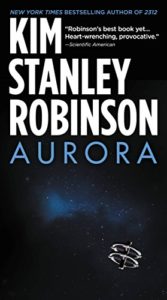Humanity has a seemingly endless fascination with exploration. It’s as if it’s built into our DNA, which it probably is. People have been fascinated with exploring new lands for millennia with expeditions to the New World, Antarctica, and Moon being some of the more recent. Aurora, by Kim Stanley Robinson, is written based on this tradition.
The book chronicles a group of space travelers who are sent from Earth to explore the Tau Ceti star system. More specifically, their destination is Tau Ceti e, an exoplanet located in the star system’s “habitable zone” thought to be 3-4x the size of Earth. Unlike other science fiction accounts, these are real celestial bodies that were discovered by NASA’s Kepler telescope.
The detail that Robinson puts into the book is what makes it fascinating. He doesn’t take outlandish liberties with technology to envision how a group of human colonists might explore a planet outside of our solar system. He goes into great detail explaining the structure of the ship that the spacefarers inhabit, how it has been setup to support them on their 150+ year journey to the new system, and the challenges that they could face along the way.
In addition to exploring how humans might reach an earth “analog”, what it would take to get there, and the risks involved, Robinson also explores the physical and psychological impacts a journey would have on the group. In his view, it would take tremendous sacrifice on the group who would choose to go on the journey that would be handed down to future generations since such a trip could not be completed over the span of a single human lifetime.
Aurora is not your typical science fiction book. I would liken it to a written docudrama. About 80-85% of the book is an exploration, scientific study of space travel. The remaining 15-20% is the entertainment part. It primarily focuses on the life of one of the individuals and her perspective on the journey and their mission.
I found Aurora interesting. It is a very detailed, plausible scenario of how humans could explore planets outside of the solar system. It’s not a great read if you’re looking for a fast-paced, action-packed sci-fi thriller. It’s also not the right book if you’re interested in a space opera. There’s plenty of other books to fill those roles. However, if you’re interested in the science and the scenarios of how we might explore space and other planets, then Aurora is your book.


Pingback: My 2020 reading list - Gregg Borodaty